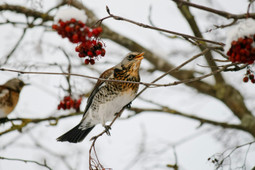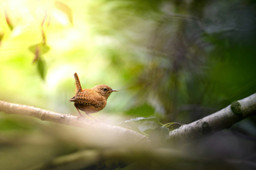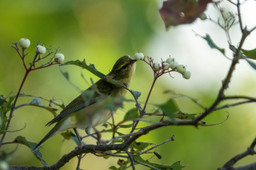
It may feel that we shouldn’t need scientific evidence to tell us that birdsong is conducive to relaxation. Still…
What are the benefits of listening to birds’ calls?
This integral part of our surroundings has surely been associated with peace and tranquility since time immemorial: for the whole of Homo sapiens’ nearly 200,000 years of existence, we have lived alongside bird populations (more closely than in today’s increasingly urbanized world). Across these millennia, positive associations may have become ingrained because we learnt that when the birds sing we are safe, and that “it’s when birds stop singing that people need to worry”.
We may also have a “genetic preference for sounds that make us think of nature”, because in the past such sounds would have been “associated […] with places that had abundant resources”. As the dawn chorus “signal[s] the start of the day”, birdsong also has the effect of “stimulat[ing] us cognitively”, but without this effect on the brain “being too distracting”. This “gentle stimulation helps relieve [the] fatigue that impairs concentration”.

More simply, it has been theorized that positive memories and associations connected with birdsong – for example, in relation to the warmer seasons – mean that we feel positive emotions when we hear it.
Are these benefits backed up by science?
As inherent as these associations might seem, we would like to follow up our previous article, ‘The Benefits of Birdsong to Mental Health’, by drawing your attention to some recent studies which support those advantages. Specifically, investigations into the effect of birdsong on the nervous system have found reductions of anxiety and paranoia.
🐦 Calm Birdsongs for Relaxation and Focus playlist on earth.fm ☁️
‘Birdsongs Alleviate Anxiety and Paranoia in Healthy Participants’ used traffic noise and birdsong as examples of urban and natural soundscapes. In contrasting these soundscapes’ effects on mood and paranoia, it was found that traffic noise was “associated with a significant increase in depression”. In direct contrast, “depression exclusively decreased” after participants listened to a high-diversity birdsong soundscape for just six minutes. Similarly, anxiety and paranoia also “significantly decreased” after exposure to both high- and low-density birdsong soundscapes.
As such, the authors note that their findings warrant further investigation, “such as actively manipulating soundscapes in different environments or settings (e.g., psychiatric wards)”.

“Never before has such a large percentage of humanity been so far removed from nature”: more than half of all people currently live in urban areas, a proportion predicted to increase to 70% by 2050. But what effect might this demographic shift have on mental health? While “urbanization has many benefits,” as noted in the abstract of ‘Nature Experience Reduces Rumination and Subgenual Prefrontal Cortex Activation’, “it also is associated with increased levels of mental illness, including depression.”
This correlation may be caused by the effect that nature exposure has on rumination (“repetitive thinking or dwelling on negative feelings”). In order to test this hypothesis, participants undertook “a brief nature experience”: walking for an hour and a half in a natural setting. This activity caused decreases to self-reported rumination and reductions in neural activity in the subgenual prefrontal cortex, a “brain region involved in emotional regulation and reward mechanisms” and “linked to risk for mental illness”. This was not the case for a different group who undertook an urban walk of the same length.
These results suggest that “nature experience may improve mental well-being” – meaning that accessible natural areas within our increasingly urbanizing world may be vital for maintaining mental health.
In its discussion section, the report notes that some cities are starting to incorporate “public access to greenspace” into urban planning, in a way which “may influence stress, mental health, and even cognitive functioning”. Further understanding of the way the natural world “buffers against the negative repercussions of urban life” will enable these positive effects to be harnessed more effectively as urbanization continues to increase.

Studies have found that listening to recordings of birdsong can have the same effect as the real thing, “hit[ting] the same pathways that might be beneficial toward mental well-being”, with participants’ noting “decrease[d] feelings of anxiety, depression, and paranoia”. Earth.fm offers numerous opportunities to connect with birdsong, at any time and place and in any way you want or need to.
Factors such as melodiousness, volume, frequency, cultural perception (such as the negative connotations attached to, say, owls), and familiarity can “affect how [mentally] restorative birdsong is”. You may therefore find that trial and error is necessary to identify species whose calls you find particularly helpful for your wellbeing.
Studies highlighting the positive effects of birdsong highlight the need to protect diminishing global bird populations. The most recent State of the World’s Birds report, a four-yearly publication by BirdLife International, paints a stark picture: one in every eight species is currently under threat of extinction – more than 1,400 species.

In the UK specifically, 600 million breeding birds have been lost since 1980. In the US and Canada, 2.9 billion breeding adults have been lost, across every biome. This incomprehensible loss – of more than one in four birds within less than a lifetime – “suggests the very fabric of North America’s ecosystem is unraveling”.
However, there is much that we can all do to support local avian populations, from making windows safer for birds, purchasing shade-grown coffee, providing drinking water, food, and nestboxes, keeping cats (which kill approximately four billion birds per year in the US alone) indoors – and more.
🐦 Please consider listening to some of the earth.fm birdsong soundscapes below:
- ‘Asian Meadow’
- ‘Australia – Alpine Woodland’
- ‘Birdsong and Rain’
- ‘Birdsong in Flói’
- ‘Birdsong in Nourlangie’
- ‘Dawn Chorus at Castle Wood’
- ‘Early Spring in the Sonoran Desert’
- ‘Fascinating Birdsong in the Congo Rainforest’
- ‘Fiji Rainforest’
- ‘San Pedro River Soundscape’
- ‘Woodland Birdsong from Italy’
Earth.fm is a completely free streaming service of 1000+ nature sounds from around the world, offering natural soundscapes and guided meditations for people who wish to listen to nature, relax, and become more connected. Launched in 2022, Earth.fm is a non-profit and a 1% for the Planet Environmental Partner.
Check out our recordings of nature ambience from sound recordists and artists spanning the globe, our thematic playlists of immersive soundscapes and our Wind Is the Original Radio podcast.
You can join the Earth.fm family by signing up for our newsletter of weekly inspiration for your precious ears, or become a member to enjoy the extra Earth.fm features and goodies and support us on our mission.
Subscription fees contribute to growing our library of authentic nature sounds, research into topics like noise pollution and the connection between nature and mental wellbeing, as well as funding grants that support emerging nature sound recordists from underprivileged communities.

